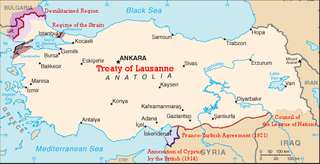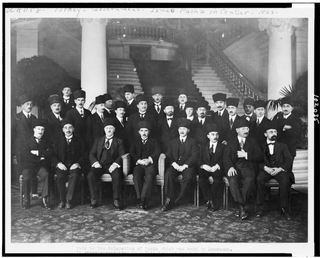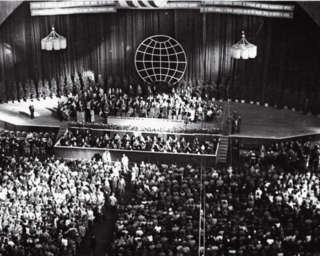See also
- Lausanne Congress of Supreme Councils of 1875, a Freemasonry conference
Lausanne Conference or Conference of Lausanne may refer to:

The Treaty of Lausanne was a peace treaty negotiated during the Lausanne Conference of 1922–23 and signed in the Palais de Rumine, Lausanne, Switzerland, on 24 July 1923. The treaty officially settled the conflict that had originally existed between the Ottoman Empire and the Allied French Republic, British Empire, Kingdom of Italy, Empire of Japan, Kingdom of Greece, and the Kingdom of Romania since the onset of World War I. The original text of the treaty is in French. It was the result of a second attempt at peace after the failed and unratified Treaty of Sèvres, which aimed to divide Ottoman lands. The earlier treaty had been signed in 1920, but later rejected by the Turkish National Movement who fought against its terms. As a result of Greco-Turkish War, İzmir was retrieved and the Armistice of Mudanya was signed in October 1922. It provided for the Greek-Turkish population exchange and allowed unrestricted civilian passage through the Turkish Straits.
Paris Peace Conference may refer to:
Geneva Conference may refer to:

The Treaty of Sèvres was a 1920 treaty signed between the Allies of World War I and the Ottoman Empire. The treaty ceded large parts of Ottoman territory to France, the United Kingdom, Greece and Italy, as well as creating large occupation zones within the Ottoman Empire. It was one of a series of treaties that the Central Powers signed with the Allied Powers after their defeat in World War I. Hostilities had already ended with the Armistice of Mudros.
2nd Congress may refer to:

The Conference of Lausanne was a conference held in Lausanne, Switzerland, during 1922 and 1923. Its purpose was the negotiation of a treaty to replace the Treaty of Sèvres, which, under the new government of Mustafa Kemal Atatürk, was no longer recognized by Turkey.

The World Peace Council (WPC) is an international organization that advocates universal disarmament, sovereignty and independence and peaceful co-existence, and campaigns against imperialism, weapons of mass destruction and all forms of discrimination. It was founded in 1950, emerging from the policy of the Communist Party of the Soviet Union to promote peace campaigns around the world in order to oppose warmongering by the United States. Throughout the Cold War, it was largely funded and controlled by the Soviet Union, and refrained from criticizing or even defended the Soviet Union's involvement in numerous conflicts. These factors led to the decline of its influence over the peace movement in non-Communist countries. Its first president was the French physicist and activist Frédéric Joliot-Curie. It was based in Helsinki, Finland from 1968 to 1999, and since in Athens, Greece.

The Canadian Peace Congress is an anti-imperialist group founded in 1949 by Canadian minister James Gareth Endicott in response to the new dangers to peace posed because of the Cold War. It described itself as "a place where people of different views and faiths can meet and discuss world affairs... and work together as effectively as possible to improve international relations and step by step [move] towards the goal of universal disarmament and a lasting peace" The CPCon was the Canadian affiliate of the World Peace Council and a leading player in the peace movement in Canada, particularly in the 1950s and 1960s. The CPCon was active in the nuclear disarmament and anti-imperialist movements such as the movement against the Vietnam War and promoted the concept of peaceful co-existence between the Communist bloc and the Western bloc.

The First International Congress on World Evangelization (ICOWE), also sometimes called the Lausanne Congress or Lausanne '74, was held from 16 to 25 July 1974.
The name Lausanne Congress may refer to the following international conclaves held in Lausanne, Switzerland:
The Lausanne Conference of 1949 was convened by the United Nations Conciliation Commission for Palestine (UNCCP) from 27 April to 12 September 1949 in Lausanne, Switzerland. Representatives of Israel, the Arab states Egypt, Jordan, Lebanon and Syria, and the Arab Higher Committee and a number of refugee delegations were in attendance to resolve disputes arising from the 1948 Arab–Israeli War, mainly about refugees and territories in connection with Resolution 194 and Resolution 181.
Lausanne is a city in Switzerland.

The Ligue internationale de la paix was created after a public opinion campaign against a war between the Second French Empire and the Kingdom of Prussia over Luxembourg. The Luxembourg crisis was peacefully resolved in 1867 by the Treaty of London but in 1870 the Franco-Prussian War could not be prevented so the league dissolved and refounded as the 'Société française pour l'arbitrage entre nations' in the same year.
A peace congress, in international relations, has at times been defined in a way that would distinguish it from a peace conference, as an ambitious forum to carry out dispute resolution in international affairs, and prevent wars. This idea was widely promoted during the nineteenth century, anticipating the international bodies that would be set up in the twentieth century with comparable aims.
The Lausanne Committee for World Evangelization, more commonly known as the Lausanne Movement, is a global movement that mobilizes evangelical leaders to collaborate for world evangelization. The stated vision is "the whole church taking the whole gospel to the whole world".

Palais de Beaulieu is the historical and emblematic building of the Lausanne convention and exhibition center, located in Lausanne, in the Vaud Canton, Switzerland. The Palais is a convention centre that welcomes mainly conventions and events.
The World Muslim Congress is an Islamic organization based in Karachi. Its co-founder and Secretary-General for over four decades was Inamullah Khan. It was the recipient of the 1987 Niwano Peace Prize, and Khan was the recipient of the 1988 Templeton Prize. It has general consultative status with the United Nations Economic and Social Council.

The World Congress of Intellectuals in Defense of Peace was an international conference held on 25 to 28 August 1948 at Wrocław University of Technology. It was organized in the aftermath of the Second World War by the authorities of the Polish People's Republic and the Soviet Union, and aimed against American imperialism.

The Château d'Ouchy is a hotel built on the site of an old medieval castle in Lausanne, Switzerland by fr:Jean-Jacques Mercier between 1889 and 1893.